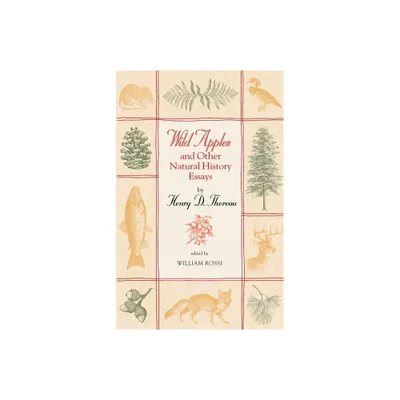Home
Wild Apples and Other Natural History Essays / Edition 1
Loading Inventory...
Barnes and Noble
Wild Apples and Other Natural History Essays / Edition 1
Current price: $28.95


Barnes and Noble
Wild Apples and Other Natural History Essays / Edition 1
Current price: $28.95
Loading Inventory...
Size: OS
*Product Information may vary - to confirm product availability, pricing, and additional information please contact Barnes and Noble
This volume of seven essays and a late lecture by Henry David Thoreau makes available important material written both before and after
Walden
. First appearing in the 1840s through the 1860s, the essays were written during a time of great change in Thoreau's environs, as the Massachusetts of his childhood became increasingly urbanized and industrialized.
William Rossi's introduction puts the essays in the context of Thoreau's other major works, both chronologically and intellectually. Rossi also shows how these writings relate to Thoreau's life and career as both writer and naturalist: his readings of Ralph Waldo Emerson and Charles Darwin; his failed bid for commercial acceptance of his work; and his pivotal encounter with the utter wildness of the Maine woods. In the essays themselves, readers will see how Thoreau melded conventions of natural history writing with elements of two popular literary forms—travel writing and landscape writing—to explore concerns ranging from America's westward expansion to the figural dimensions of scientific facts and phenomena.
Thoreau the thinker, observer, wanderer, and inquiring naturalist—all emerge in this distinctive composite picture of the economic, natural, and spiritual communities that left their marks on one of our most important early environmentalists.
Walden
. First appearing in the 1840s through the 1860s, the essays were written during a time of great change in Thoreau's environs, as the Massachusetts of his childhood became increasingly urbanized and industrialized.
William Rossi's introduction puts the essays in the context of Thoreau's other major works, both chronologically and intellectually. Rossi also shows how these writings relate to Thoreau's life and career as both writer and naturalist: his readings of Ralph Waldo Emerson and Charles Darwin; his failed bid for commercial acceptance of his work; and his pivotal encounter with the utter wildness of the Maine woods. In the essays themselves, readers will see how Thoreau melded conventions of natural history writing with elements of two popular literary forms—travel writing and landscape writing—to explore concerns ranging from America's westward expansion to the figural dimensions of scientific facts and phenomena.
Thoreau the thinker, observer, wanderer, and inquiring naturalist—all emerge in this distinctive composite picture of the economic, natural, and spiritual communities that left their marks on one of our most important early environmentalists.


















